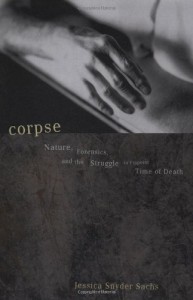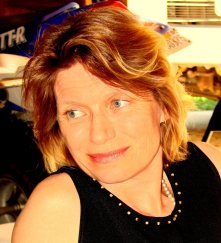Book Review-Corpse
For my book review I chose to read is Corpse by Jessica Snyder Sachs. Now I thought I would like this book, all the reviews I read about Corpse says it’s about some detectives that come across a murder case and have to figure the time of death and how this person died by science and tactics used on the body. But I will start off by saying that’s not what I read at all, and this book isn’t for everyone, for me it was very boring and confusing I could not for the life of me get into this book. It was all over the place, I could not tell when the subject was changing which just made me constantly lost in the book.
As quoted from the back of the book “it is a must read not only for forensic investigators but also for those learning how science can solve the problems of the past.” Which I do agree with, but I’m neither of those, so maybe that’s why it was such a hard read for me. I felt this book was very repetitive. Talking about different stages in the decaying process of a body. The first 60 pages of the book are very dry and boring, actually in my opinion if they aren’t talking about a murder case and talking about the decaying process it is very boring, but when they were talking about a murder case the book had my full attention.
Jessica Snyder Sachs is a editor for magazines like Health, Parenting, Popular Science, and Discover, she has been a freelance writer since 1991. Most of her writing is science related, Corpse was her very first book she wrote, another book of hers is Good Germs, Bad Germs, which is about bacterial ecosystems that bathe inside a healthy human body. Jessica graduate from Columbia Journalism School with a mid-career master with cross-disciplinary graduate studies in immunology, microbiology and infectious disease.
Some of her awards include the Fund for Investigative Journalism’s 2006 book award, fellowships from the Alicia Patterson Foundation and the Council for the Advancement of Science Writing and a research grant from the Sloan Foundation. And in 2006, her Discover feature on the effects of antibiotics on the body’s good bacteria was selected for inclusion in the anthology Best American Science and Nature Writing. Another of her Discover features “DNA Pollution May be Spawning Killer Microbes” was included in Best American Medical Writing 2009.
Not only does she has a educational background in some of the science that is used in finding out a murder time line and how the person died, she also went and found people to interview about different cases throughout history, she went to Smithsonian Institution which is the top of the top forensics science department in Washington D.C. She did lots of research, and reporting. Some of the stories she tells are hard to believe but I think they way she is telling they she was told about the stories in great detail in an interview, because she was able to set the scene as if she was actually there but I don’t think she actually was there, I think she just got that good of detail from the people she interviewed, that she was able to make it seem like she was there watching and taking note of what the forensic anthropologies was doing.
I can’t really tell if the author is emotionally attached to the stories she tells or if she’s just telling them and doing her job. She has her stories set up so that she can go straight into the science part of the book without warning, and it switches back and forth to her giving information about forensic science and the actual forensic anthropologist that’s at the crime scene giving the facts about what they see and figure out about the body.
I’d give this book a 2 out of 5 stars, amazon gave it 4.5 starts out of 5. My reason for my grade is because I’m not in forensics science. I love CSI shows, and before going down the path of a Mass Communication major, criminal justice was at the top of my list for possible majors. I’ve always wanted to be a cop/CSI investigator, so yes it is all very interesting to me but because I’ve never had a anatomy or a science class that teaches you about the body about death everything science related in this book just went completely over my head. She did “dumb” down the lingo. For example, one of my all time favorite shows in Bones on Fox, it is all about a group of forensic anthropologists who work at the Smithsonian in Washington D.C. solving crazy murder cases after the body has gone through a lot of decomposing stages, just like what is in Jessica’s book. The TV show has the very intense scientific lingo like in the book, but the directors of the show some how work out the script so that the average person still understands what is being talked about and what they are saying. The show, for a lack of better words, “dumbs down” the scientific side of a crime but still uses all the scientific terms, if that makes any sense. Reading Corpse made me feel stupid because I did not understand anything the author was talking about. I do not want to read a book and feel stupid as I’m reading it. That just makes me put the book down.
It was also very repetitive, she went on and on and on about the stages your body goes through in the first handful of hours once you pass away. I get it, your body tenses up at about four hours, and then relaxes after a while, move on. The temp of your body takes a certain amount of time after death to start getting cooler and cooler, and if you do the right math just by the temp of the body that it was found at you can find the exact time of hour minute and probably seconds the person died at. She spent about 60 pages too many explaining just that.
 Comments(1)
Comments(1)

Sorry you did not have a good experience with the book, Caitlin. This is a recent purchase, so I haven’t read it, and you’re the first student to take it on. Now I know more.
I think I used one of her articles in my C&C class. Students have similar responses to the science and nature text: the language is difficult, and it does seem like the authors spend too much time explaining. But science isn’t easy. If you’re writing to an audience of experts, you have to make sure every base is covered.
This really needs some clean up on mechanics. Seems like a quick first draft that now needs some attention to detail.